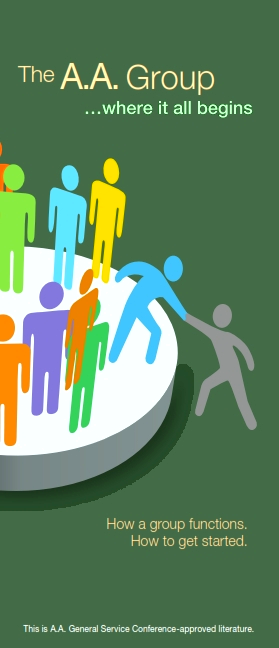Any gathering of two or more alcoholics who wish to recover and have no other affiliation may call themselves an A.A. group. Membership at the group level is open to all who have a desire to recover from alcoholism. There are no dues, fees, requirements or restrictions of any kind. There’s no formal application to join a group. All groups exist to help those who suffer from the disease of alcoholism.
The following sections are reprinted from the pamphlet The A.A. Group ... Where It All Begins, Copyright © 2018, with permission of A.A. World Services, Inc.
The purpose of all A.A. group meetings, as the Preamble states, is for A.A. members to “share their experience, strength and hope with each other that they may solve their common problem and help others to recover from alcoholism.” Toward this end, A.A. groups have both open and closed meetings.
Closed meetings are for A.A. members only, or for those who have a drinking problem and “have a desire to stop drinking.”
Open meetings are available to anyone interested in Alcoholics Anonymous’ program of recovery from alcoholism. Non-alcoholics may attend open meetings as observers.
At both types of meetings, the A.A. chairperson may request that participants confine their discussion to matters pertaining to recovery from alcoholism.
Whether open or closed, A.A. group meetings are conducted by A.A. members who determine the format of their meetings.
We may use last names within our group. At the same time, we respect the right of other members to maintain their own anonymity however they wish, and as closely as they wish. Some groups keep a list of names and telephone numbers volunteered by their members, and may provide phone lists — but for the eyes of the group members only.
We repeat no one’s personal sharing made in A.A. meetings. The word “anonymous” in our name is a promise of privacy. Besides, the only story of recovery we can truly share is our own.
In our personal relationships with non-alcoholics and with those we think might have a problem with alcohol — we may feel free to say that we are recovering alcoholics (without divulging the names of other A.A. members), although discretion is recommended. Here our openness may help to carry the message.
We refrain from videotaping that special A.A. talk or meeting, which might receive exposure at the public level. And, as the 1980 General Service Conference recommended, it is wiser that talks by A.A. members be given in person, in view of the temptation when videotaping to place personalities before principles and thus encourage the development of a “star” system in Alcoholics Anonymous.
For more information about this important Tradition, see the A.A. pamphlet “Understanding Anonymity.”
Traditionally, most A.A. members through the years have found it important to belong to one group that they call their “home group.” This is the group where they accept service responsibilities and try to sustain friendships. And although all A.A. members are usually welcome at all groups and feel at home at any of these meetings, the concept of the home group has still remained the strongest bond between the A.A. member and the Fellowship.
Over the years, the very essence of A.A. strength has remained with our home group, which, for many members, becomes our extended family. Once isolated by our drinking, we find in the home group a solid, continuing support system, friends and, very often, a sponsor. We also learn firsthand, through the group’s workings, how to place “principles before personalities” in the interest of carrying the A.A. message.
- Our common welfare should come first; personal recovery depends upon A.A. unity.
- For our group purpose there is but one ultimate authority — a loving God as He may express Himself in our group conscience. Our leaders are but trusted servants; they do not govern.
- The only requirement for A.A. membership is a desire to stop drinking.
- Each group should be autonomous except in matters affecting other groups or A.A. as a whole.
- Each group has but one primary purpose to carry its message to the alcoholic who still suffers.
- An A.A. group ought never endorse, finance or lend the A.A. name to any related facility or outside enterprise, lest problems of money, property and prestige divert us from our primary purpose.
- Every A.A. group ought to be fully self-supporting, declining outside contributions.
- Alcoholics Anonymous should remain forever nonprofessional, but our service centers may employ special workers.
- A.A., as such, ought never be organized; but we may create service boards or committees directly responsible to those they serve.
- Alcoholics Anonymous has no opinion on outside issues; hence the A.A. name ought never be drawn into public controversy.
- Our public relations policy is based on attraction rather than promotion; we need always maintain personal anonymity at the level of press, radio and films.
- Anonymity is the spiritual foundation of all our Traditions, ever reminding us to place principles before personalities.

